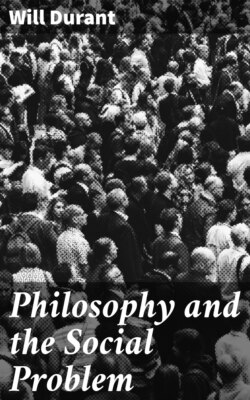Читать книгу Philosophy and the Social Problem - Уилл Дюрант - Страница 8
На сайте Литреса книга снята с продажи.
II
Philosophy as Disintegrator
ОглавлениеTHE rise of philosophy, then, often heralds the decay of a civilization. Speculation begins with nature and begets naturalism; it passes to man—first as a psychological mystery and then as a member of society—and begets individualism. Philosophers do not always desire these results; but they achieve them. They feel themselves the unwilling enemies of the state: they think of men in terms of personality while the state thinks of men in terms of social mechanism. Some philosophers would gladly hold their peace, but there is that in them which will out; and when philosophers speak, gods and dynasties fall. Most states have had their roots in heaven, and have paid the penalty for it: the twilight of the gods is the afternoon of states.
Every civilization comes at last to the point where the individual, made by speculation conscious of himself as an end per se, demands of the state, as the price of its continuance, that it shall henceforth enhance rather than exploit his capacities. Philosophers sympathize with this demand, the state almost always rejects it: therefore civilizations come and civilizations go. The history of philosophy is essentially an account of the efforts great men have made to avert social disintegration by building up natural moral sanctions to take the place of the supernatural sanctions which they themselves have destroyed. To find—without resorting to celestial machinery—some way of winning for their people social coherence and permanence without sacrificing plasticity and individual uniqueness to regimentation—that has been the task of philosophers, that is the task of philosophers.
We should be thankful that it is. Who knows but that within our own time may come at last the forging of an effective natural ethic?—an achievement which might be the most momentous event in the history of our world.
